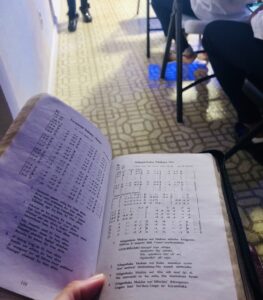A Holy Precedence
When the day of Pentecost came, they were all together in one place. Suddenly a sound like the blowing of a violent wind came from heaven and filled the whole house where they were sitting. They saw what seemed to be tongues of fire that separated and came to rest on each of them. All of them were filled with the Holy Spirit and began to speak in other tongues as the Spirit enabled them.
Now there were staying in Jerusalem God-fearing Jews from every nation under heaven. When they heard this sound, a crowd came together in bewilderment, because each one heard their own language being spoken.
Acts 2:1-6 NIV
I’m continually in awe of the Holy Spirit’s manifold presence at Pentecost. As I recently wandered through Acts chapter two, I wondered more specifically at the tongues of fire and rushing wind. I was curious: Was each apostle producing a message in one language while everyone in the crowd simultaneously received the same message in a different language? How did Pentecost set a precedence for the value of interpreters?

The Kinyarwanda-speaking home church slowly piled into Charlene’s finished basement. With the two traveling evangelists only visiting for a day, the group was larger than usual. Since I was charged with getting the evangelists to the proper location, I had a moment to talk with them as the rest trickled in with kids of all ages in tow. I’m used to sitting with Kinyarwanda-speaking mamas whose level of English limits lengthy conversations—and I know even less Kinyarwanda vocabulary. The traveling evangelists and I were mutually curious about each other. I explained my role of service in local diaspora communities. And these young evangelists were what I imagined of early church leaders as they traveled to encourage brothers and sisters in the faith scattered around a country where the dominant language and culture were foreign to them.

I fawned over Charlene’s new baby and my other toddler friend who zealously climbed into my lap. As the only white, English speaker in the room, I knew I stood out, but I was comfortable with this crowd. They were a part of my treasured community.
I have spent my whole life in situations where I rely on context clues, limited vocabulary, body language, and borrowed words to interpret what’s going on in a situation. When I was little, my mom would often take me and my sisters to visit the Greek people’s house. The hosts would squeeze our little cheeks and serve us Turkish delight. In those spaces as a kid with Greek Immigrant parents, I learned to make meaning with limited understanding. A visit to someone’s house with unique ethnic foods, foreign chit chat, and cute kiddos became a comfortable context for me. Religious gatherings were another familiar environment—I expected patterns of preaching, singing, and Scripture reading—in any language. I would eagerly wait for Bible vocabulary to pop amongst chatter I didn’t understand, and I was quick to rise in worship or kneel in prayer as the situation called for it.
As a Language and Culture Learning Specialist in diaspora contexts, this has become a lifestyle for me. I have also grown adept at providing the kinds of context clues and key vocabulary that English Language Learners need in order to figure out what’s going on around them.
I showed up for Kinyarwanda house church expecting to fumble my way through for a couple hours, then eventually slip out the back unnoticed. But the evangelists didn’t want the blessing of the message of God to be wasted on my lack of understanding. They wanted to make the message clear and comprehensible—the heart of interpretation. I felt honored that they would scramble to come up with a plan that included my comprehension. It was decided that one of the traveling evangelists would preach the message while the other would interpret into English–up front for all to hear.
The Gap in Interpreter Training
Recently, I assisted a multilingual friend as she sorted through various job offers as a part time interpreter. As many families from her primarily oral language group were arriving in our community, healthcare facilities and other nonprofit agencies were desperate for comprehensible communication through the process of resettlement.
At one end of the interpreter spectrum are highly trained, certified interpreters who specialize in their legal or healthcare fields. On the other end of the spectrum are many of my friends who have no special training but have logged countless hours spontaneously interpreting in any domain they find themselves in—high schools, doctor appointments, immigration offices, grocery stores—even if they are unfamiliar with the key terminology in those domains. After so much hands-on experience, they come to be known for their specialized skills. Such was the case for my multilingual friend—the desperate need for understanding outweighed the professional certification requirements.

Translation vs. Interpretation
People often use the terms interpretation and translation interchangeably, but they are different. According to the professional translation service, TranslateHub, though both the interpreter and the translator require an in-depth knowledge of the languages and cultures they are working with, the translator needs time to edit their formal written work—whereas the interpreter must aptly understand the oral context, intonation, and audience in order to deliver comprehensible oral input in a moment.
Types of Interpretation
Simultaneous Interpretation: the speaker of the first language starts a sentence, and their interpreter must relay that sentence while also listening to the one that follows in a continuous flow of uninterrupted speech. This requires intense focus and skill.
Consecutive Interpretation: this method involves the speaker finishing a thought and pausing to allow the interpreter time to express that idea in the target language before speaking the next thought. Most of the interpreting in my circles is consecutive interpretation–it was also the chosen method of the Kinyarwanda-speaking evangelists.
Chunking: the linguistic concept of grouping words together that express a cohesive thought. It’s not always sentence by sentence. All interpretation requires an understanding of chunking. It takes practice for the speaker and interpreter to know when to take natural chunking breaks to allow for an accurate and reliable interpretation of the same idea in the target language.
Whisper Interpretation: the interpreter sits next to the person who needs interpreting in a particular language and whispers to them in that language. That’s what I was hoping the evangelist appointed as my interpreter would do. And maybe, it’s how the Holy Spirit coordinated Pentecost?

Be Utterly Amazed
Utterly amazed, [the crowd] asked: “Aren’t all these who are speaking Galileans? Then how is it that each of us hears them in our native language? Parthians, Medes and Elamites; residents of Mesopotamia, Judea and Cappadocia, Pontus and Asia, Phrygia and Pamphylia, Egypt and the parts of Libya near Cyrene; visitors from Rome (both Jews and converts to Judaism); Cretans and Arabs—we hear them declaring the wonders of God in our own tongues!”
Acts 2:7-11 NIV
After worshiping with the Kinyarwanda-speaking congregation and cooing over my little friends, I plotted my leave-taking moment. Since my consecutive interpretation was public, I was waiting for the speaker’s pause in thought so I could communicate my goodbyes without significant interruption. I handed the littles back to their mamas and when the moment was right, I publicly thanked and blessed the small congregation. I specifically expressed my gratitude to the preaching evangelist and especially to the interpreter.
It’s easy to take the interpreter for granted. In fact, the better they are at their job, the more they go unnoticed. Among the language needs in diaspora communities, sometimes the unnoticed interpreter gets forgotten once the task at hand is complete. But if your interpreters are resettling refugees trying to find meaningful employment, their vital skill set warrants respect and often compensation. Whether you need your message interpreted or are on the receiving end of the interpreted message—don’t forget to notice the interpreter—the one who gives the blessing of comprehension. Whether they are highly trained, or trained on the job; sometimes reluctant, or have a special knack for it—take a moment to wonder at the God-given capacity to understand and be understood. Go ahead, be utterly amazed.
